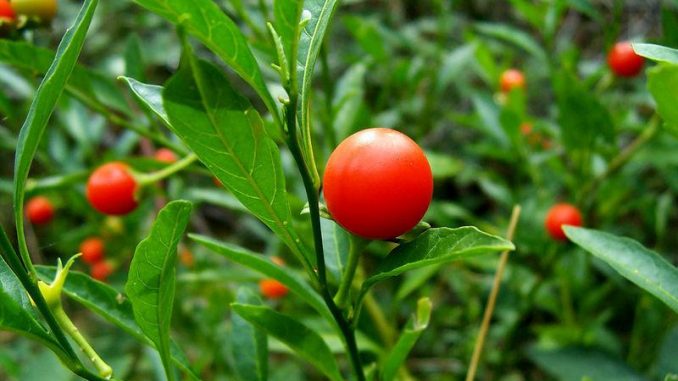
- This is a family of wide distribution.
- Plants are terrestrial and are adapted to grow in temperate and tropical places, growing wild in shady places.
- They are annual herbs, shrubs and rarely trees.
Roots: They have tap root system, and the roots are branched.
Stem:
- Stem is erect and weak, may be aerial or underground.
- It is herbaceous, may be profusely branched, hairy or prickly.
- It is solid and cylindrical with tuberous in the case of potato.
Leaves:
- They may be simple or pinnately compound (as in tomato).
- They are alternate or opposite, exstipulate, hairy, petiolate, dentate, ovate, unicostate and reticular venation.
Inflorescence: Cymose or solitary axillary
Flowers:
- They are complete, small, usually white in color, pentamerous, hypogynous and bisexual.
- They are pedicellate, ebracteate, actinomorphic.
Calyx:
- 5 sepals, green in color, gamosepalous, campanulate or tubular.
- Valvate or imbricate aestivation, persistent.
Corolla:
- 5 petals,of various shape and color, gamopetalous, rotate, lobes oblong or tubular
- valvate or imbricate aestivation
Androecium:
- Stamens 5, generally yellow in color, polyandrous, epipetalous anthers, massive
- Filaments are short, anther oblong, basifixed and bicelled
- Dehiscence of anthers is by means of apical pores as in Solanum species or by longitudinal slits.
- Anthers form a cone around the style.
Gynoecium:
- Bicarpellary, syncarpous, ovary is superior and obliquely placed.
- Ovary is bilocular with swollen placenta, placentation is axile.
- Style is thick and short, stigma is sticky, bifid or bilobed and capitate.
Fruit: Berry with persistent calyx or spinous capsule
Floral diagram with floral formula (Solanum nigrum or black nightshade):

Some important plants of the family:
- Solanum tuberosum (potato)
- Solanum melongena (brinjal)
- Capsicum annum (green pepper)
- Lycoperscum esculentum (tomato)
- Nicotiana tobaccum (tobacco)
- Petunia hybrida (petunia)
- Datura metel (devil’s trumpet)
- Datura stramonium (jimsonweed)
- Withania somnifera (ashwagandha or rennet)
Economic importance:
- Solanum tuberosum, melongena, Capsicum annum, Lycopersicum esculentum etc. are used as vegetables.
- Nicotiana tobaccum leaves and stem are used for preparing cigarettes and tobacco products.
- Atropa belladonna’s dried leaves, stems and roots yield ‘belladona’ to relieve pain, cough and excessive perspiration. Atropine is a drug obtained from the dried leaves of some plants to dilate the pupil of the eye.
- Dried leaves and roots of Datura metel and stramonium are used for the treatment of asthma.
- Withania somnifera can coagulate milk for making cheese.
- Petunia hybrida, Cestrum nocturnum, Solanum villosum have ornamental value.